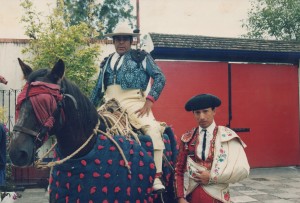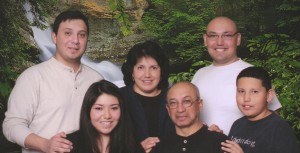
Thirty years after his retirement from bull fighting, those who remember him still call him “matador” when they greet him.
His house doesn’t look much different than any other house in Orem. It is simple and modestly decorated but with a sense of pride and history. Replications of movie posters from the 1960s hang on the walls; each one showing a matador in a grand, defiant posture against a raging bull.
In between the posters hangs the final clue: a head of a menacing bull, horns-spread, mounted in the center of the room.
This man was a matador.
Miguel Angel Lopez was born in April 1963 in Mexico City and moved to Orem in 2004. He came from a family that always wanted a bullfighter in its bloodline. His father loved watching any bullfighting event he could attend and passed that love to each member of the family, beginning with Lopez’s brother.
Lopez’s brother received expensive matador lessons from trained professionals but gave up his training when Lopez was 18. Despite his brother’s failed attempts, Lopez was encouraged by his father to become a matador and saw it as an opportunity.
“It was different for me,” Lopez said. “I had to learn all by myself.”
Because of a lack of money, Lopez didn’t have access to lessons. Instead he approached trainers, asking them to show him maneuvers and techniques to help him become a master matador.
With all of his efforts, word got out that Lopez was a matador even though he hadn’t fought a bull yet. He met several bullfight contractors who jumpstarted his career, and his fame took off because of his proactive mentality.
Whenever he would fight a bull, the crowds and music greeting him at the plaza invigorated him to be his best; Lopez had friends, family and strangers counting on him to give them the best bullfight they would ever see. And he obsessed over finding ways to make that happen.
Bullfighting began to consume his life. Every waking moment was spent thinking about maneuvers and techniques he could try, Lopez said. His school studies began to suffer and he dropped out of college.
“Bullfighting is like a drug,” Lopez said with a regretful smirk.
It was around this time that Lopez met his future wife, Marina. She would come to see him fight but wasn’t interested in him solely because of it.
“I didn’t like him for his bullfighting,” she said. “I liked him for him.”

Lopez married Marina within a couple years of meeting her. Despite all the danger and harm that could befall him, he continued to fight bulls. His greatest fear was that he’d make a mistake, because he knew that the bull would not make a mistake. If the matador makes a mistake it could end in a serious injury or even death.
Lopez was accustomed to this danger. Marina never felt he would die by the horn but understood the dangers involved.
Even after suffering a broken rib, shoulder and femur, he could not wait to face another bull. Lopez considered death by a bull to be an honor.
“I respected every bull for their strength and power,” Lopez said. “I loved the bulls.”
Before every bullfighting event, matadors pray collectively and individually. Lopez knew he was in God’s hands each time he entered the ring. He believed the matador suit provided strength and bravery that helped him have courage. Lopez knew the bull wanted him dead once he looked it in the eyes.
One of his sons, Marino, 14, said his father was crazy for doing it. “I don’t like killing animals, especially bulls,” he said. Lopez tried to coax each of his five children into bullfighting but none of them pursued it.
The bulls Lopez fought many years ago are no more, yet he understands that figuratively he is still a matador fighting many “bulls.”
“When you close the door, you have to confront the rest of life’s problems,” Lopez said. He said that being a matador was not just a career or hobby, but it was his life. The things he learned from maneuvering away from horns has helped him maneuver life’s problems.
Today Lopez can be found holding a 2-year-old’s hand instead of a cape. His work as a forklift driver in the construction industry doesn’t compare to his former life. At times, he catches himself daydreaming, thinking about what his next move will be with the bull. This older, simpler man still longs for a chance to stare into a bull’s eyes and say, “I am a matador.”




